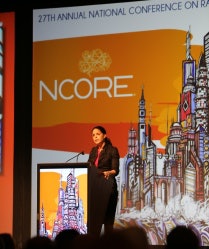 Award-winning journalist Soledad O’Brien encouraged conference goers not to wait for mainstream media to tell the important stories that involve people of color.
Award-winning journalist Soledad O’Brien encouraged conference goers not to wait for mainstream media to tell the important stories that involve people of color.INDIANAPOLIS ― It has become a recognized safe space where tough conversations about race and ethnicity can be had.
Tears sometimes flow, but hugs are also extended as faculty, administrators, staff and students from colleges and universities across the nation gather annually to discuss the tough issues of inclusion and diversity in higher education and beyond.
For nearly three decades, the National Conference on Race and Ethnicity in American Higher Education (NCORE) has been the go-to place to help rejuvenate those in the academy, whose daily work has focused on breaking down racial barriers while helping to push a social justice agenda forward that addresses a wide range of issues from mass incarceration to the challenges facing Historically Black Colleges and Universities.
“The conference has been eye opening for me,” said Matthew Nash, a student programming coordinator at the University of Oklahoma, which houses the Southwest Center for Human Relations Studies, the entity that launched the NCORE conference back in 1988. “We still have a long way to go, but I’m happy that the issues are being discussed.”
This year’s conference drew more than 2,300 participants to Indianapolis and included such high-profile speakers as Dr. Marc Lamont Hill, Cheryl Crazy Bull, environmental activist Vandana Shiva, and journalist Soledad O’Brien.
O’Brien, an award-winning journalist who left the cable network CNN last year to create Starfish Media Group—a production company committed to making documentaries that grapple with issues of race, class and poverty—encouraged conference goers not to wait for mainstream media to tell the important stories that involve people of color.
“There is a certain laziness in wanting to tell the complicated story,” she said during her keynote address on Saturday afternoon. “True leadership is about a blunt conservation, and I believe that there is not only room for blunt conversation, but it’s critical.”
Throughout the week, conference organizers paused to pay tribute to poet Dr. Maya Angelou, who died on Wednesday at the age of 86. An outspoken advocate for diversity and multiculturalism, Angelou held the lifetime appointment of Reynolds Professor of American Studies at Wake Forest University.
Dr. Belinda Biscoe, associate vice president for Outreach at the University of Oklahoma, said that NCORE has become the leader in helping to facilitate the conversation about why diversity remains important at the collegiate level.
“In this country, we are yet to get honest enough where we can have these open dialogues at a larger national level,” said Biscoe. “NCORE provides that environment.”
NCORE was born in the wake of a rash of racist incidents on college campuses in the 1980s, receiving financial support in early days from Oklahoma’s state legislature. It has since become a national clearinghouse aimed at helping to foster institutional change that focuses on improving racial and ethnic relations on campus while expanding opportunities for educational access and success, particularly for underrepresented minority groups.
“I don’t know that I’ve ever been to a conference that has this much diverse representation by race, ethnicity, religion, socioeconomic status, sexual orientation, public and private universities, colleges, community colleges and so on,” said Biscoe, who has been at the university for 16 years. “NCORE is about empowering those bold enough to be difference makers by providing information for collaboration and support.”
Briscoe said that plans are currently underway to launch a journal that comes out of the conference and that she wants to do a better job at increasing the representation of HBCUs at future conferences.
Next year, the conference will be held in Washington, D.C.
“It’s really been a great opportunity to rejuvenate and to meet people who are doing similar work,” said Olivia Seifert, an adviser and recruiter for the Educational Leadership Department at the University of Wisconsin-Superior. “It’s allowed me an opportunity to take a step back and do some reflecting.”
Jamal Watson can be reached at [email protected]. You can follow him on twitter @jamalericwatson















